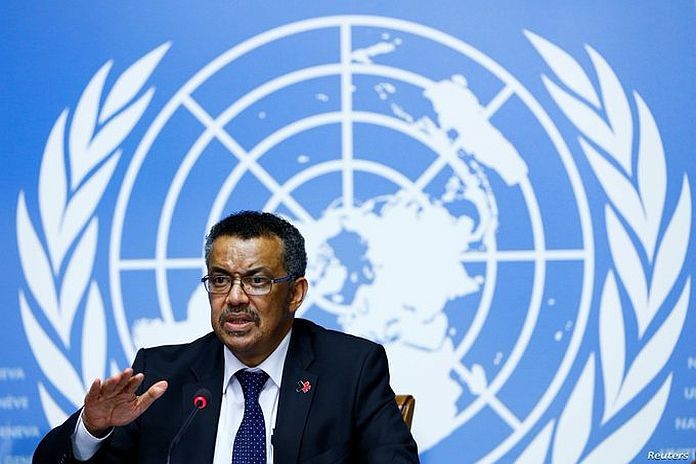– WHO Director-General’s remarks at United Nations Security Council meeting on Ukraine – 17 March 2022
GENEVA, Switzerland – The war in Ukraine is having devastating consequences for the health of Ukraine’s people; consequences that will reverberate for years or decades to come. There is severe disruption to health services and access to basic commodities, as a result of widespread destruction of infrastructure, including health facilities. WHO has verified 43 attacks on health care, with 12 people killed and 34 injured, including health workers.
In any conflict, attacks on health care are a violation of international humanitarian law. They deprive people of urgently-needed care and break already-strained health systems.
The disruption to services and supplies in Ukraine is posing an extreme risk to people with cardiovascular disease, cancer, diabetes, HIV and TB, which are among the leading causes of mortality in Ukraine.
Displacement, poor shelter, and overcrowded living conditions caused by the conflict are likely to increase the risk of diseases such as measles, pneumonia and polio. Services for mental health and psychosocial support are urgently needed to help people cope with the effects of the war.
There are more than 35,000 mental health patients in Ukrainian psychiatric hospitals and long-term care facilities, which are facing severe shortages of medicines, food, heating, blankets and more.
The war is also exacerbating the impact of the COVID-19 pandemic in Ukraine. With just one-third of the adult population fully vaccinated, this increases the risk of large numbers of people developing severe disease. Critical shortages of oxygen will have an impact on the ability to treat patients with COVID-19 and many other conditions.
At least eight facilities for producing and storing liquid oxygen have now closed, and we are seeking ways of accessing oxygen from neighbouring countries and ways to deliver it safely to where it’s needed.
WHO is on the ground, working with the ministry of health and partners to support health workers and the health system to provide care to meet immediate health needs. So far, we have sent about 100 metric tonnes of medical supplies, including oxygen, insulin, surgical supplies, anaesthetics, and blood transfusion kits – enough for 4,500 trauma patients and 450,000 primary health care patients, for one month. Other equipment, including oxygen generators, electrical generators and defibrillators have also been delivered, and we are preparing to send a further 108 metric tonnes.
We have now established supply lines from our warehouse in Lviv to many cities of Ukraine, but challenges with access remain. We need unfettered access. We have critical supplies ready for UN joint convoys to enter difficult areas, but so far we have not been successful.
[Today], for example, the UN convoy to Sumy that included a WHO truck carrying critical medical supplies was unable to enter. Loads ready for Mariupol remain in staging areas and cannot proceed. Access to these, and other areas, is now critical.
To support Ukraine’s health system, WHO is coordinating the deployment of 20 Emergency Medical Teams, consisting of experts from many countries, to deliver care across a range of disciplines, in Ukraine and neighbouring countries, which have been generous in welcoming refugees, but are struggling to meet their needs, as my colleagues said earlier.
Those needs are immense, and include continuity of care for basic illnesses, as well as more complex issues like cancer and renal dialysis, maternal and child health, HIV and TB, sexual and reproductive health and mental health. Refugees, and many of those who remain in Ukraine, are already very vulnerable – especially women and girls. Protecting them from abuse and exploitation of all kinds must be a top priority for hosting governments – and for all international organizations.
I have three urgent requests.
First, we urge the Security Council to work for an immediate ceasefire, and a political solution. Prolonged conflict is in nobody’s interests, and will only prolong the suffering of the most vulnerable. The life-saving medicine we need right now is peace.
Second, we urge all donors to support the response to humanitarian needs in in Ukraine and neighbouring countries, which are immense, and escalating every day.
Thanks to donors who front-loaded WHO’s Contingency Fund for Emergencies, we were able to respond immediately, deploying more than US$10 million to address immediate health needs. These funds were supplemented by additional funding from the UN’s Central Emergency Response Fund, CERF.
However, to sustain the response, we call on donors to fully fund the United Nations emergency appeal. As the Under-Secretary-General said, it’s only 36 percent funded so far. We thank those donors who have already pledged funding to meet the needs of people in Ukraine.
And third, although Ukraine is rightly the focus of the world’s attention, I urge you not to lose sight of the many other crises in which people are suffering.
In Afghanistan, more than half the population is in need, with widespread malnutrition and a surge in measles, among many other challenges.
In Ethiopia, the blockade of six million people in Tigray for almost 500 days has created a catastrophic food and health crisis.
In the Syrian Arab Republic, more than 12 million people are in need of health assistance, almost half of them children.
And in Yemen, roughly two-thirds of the population, more than 20 million people, are estimated to be in need of health assistance.
In every case, the only solution is peace. Our world needs peace more than ever. As if COVID is not enough, to have a devastating war like this is dangerous for the world.





